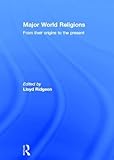Major world religions : from their origins to the present / edited by Lloyd Ridgeon.
Material type: TextLanguage: English Publication details: London ; New York : RoutledgeCurzon, 2003.Description: xii, 386 p. : ill. ; 25 cmISBN:
TextLanguage: English Publication details: London ; New York : RoutledgeCurzon, 2003.Description: xii, 386 p. : ill. ; 25 cmISBN: - 0415297680 (alk. paper)
- 0415297966 (pbk. : alk. paper)
- 9780367239435
- 200.9 21 RID
- 11.01
| Item type | Current library | Collection | Call number | Status | Date due | Barcode |
|---|---|---|---|---|---|---|
 General Books
General Books
|
CUTN Central Library Religion | Non-fiction | 200.9 RID (Browse shelf(Opens below)) | Available | 49338 |
Browsing CUTN Central Library shelves, Shelving location: Religion, Collection: Non-fiction Close shelf browser (Hides shelf browser)
Includes bibliographical references and indexes.
Cover Page
Title Page
Copyright Page
List of Contributors
Introduction Studying religion
Why Study Religion(s)?
Chapter 1 Hinduism
1 What is Hinduism?
2 Hinduism in History
3 Karma, Rebirth and Cyclic Time
4 Dharma: Norms of Conduct
5 The Gods and God
Bibliography
Chapter 2 Buddhism
1 Transcendentalism
2 The Four Noble Truths
3 The Emergence of Mahayana Buddhism
4 From India to China
5 Philosophization and Simplification
6 Transcendentalism Again
Bibliography
Chapter 3 Judaism
1 Untruths, Half-Truths and Sheer Nonsense: Balancing the Account
2 The Roots of Judaism
3 The Medieval Flowering of Judaism
4 Messianism
5 Towards Modernity: Hasidism and the Haskalah
6 Anti-Semitism and the Holocaust
7 Zionism and the Land of Israel
Bibliography
Chapter 4 Christianity
1 Key Texts
2 The Church and the World: A Variety of Approaches
3 Western Christianity and the Challenges of the Modern World
4 The Church Beyond Europe
Bibliography
Chapter 5 Islam
Introduction
1 The Testament of Faith (Shahada)
2 Prayer (Salat)
3 Fasting (Sawm)
4 The Alms Tax (Zakat)
5 Pilgrimage (Hajj)
6 Jihad: Islam and the State
Bibliography
Chapter 6 From modernism to postmodernism
1 The Origins of Modernism
2 Modern Prophets and the Death of God
3 Towards Postmodernism: The Linguistic Turn
4 Postmodern Theologies
5 Postmodern A/Theologies: The Future of Theological Thinking
Bibliography
Chapter 7 Religious fundamentalism and politics
1 What is Religious Fundamentalism?
2 Religion and Politics: What is the Connection?
3 Secularization and Religious Fundamentalists’ Political Involvement
4 Postmodernism and Religious Fundamentalism
5 Religious Fundamentalism and Ethnicity
6 Fundamentalisms: Christianity, Islam, Judaism, Hinduism, Buddhism
Bibliography
This work seeks to answer questions about the great religious traditions in the contemporary age. It focuses upon those religions that continue to demand the attention of the Western world. Following an introduction on the philosophy of religion, attention is focused on Hinduism, Buddhism, Judaism, Christianity, and Islam which are religions that have had (and probably continue to have) the greatest number of followers in Western society. In addition to the lasting impact that religion has had in society, we are witnesses to the development of secularism on the one hand and the revival of religious sentiment on the other, thus chapters on modernity, postmodernism, and 'fundamentalism' have also been included. The distinctive feature of the book is its modern feel. Each chapter brings the reader up-to-date with recent developments and commentaries upon recent religious thought, theology and religious-political movements. Moreover, the length of the chapters permits a detailed analysis which is so often lacking in books on world religions.







There are no comments on this title.